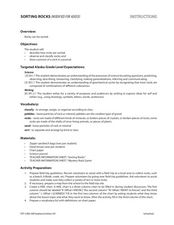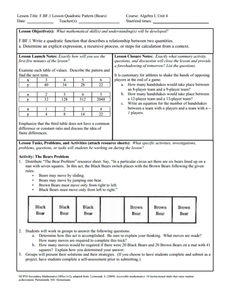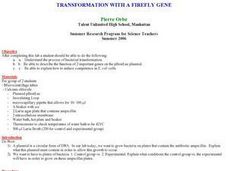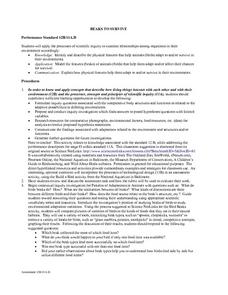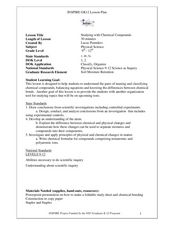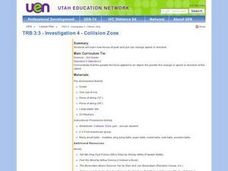Curated OER
"If the facts don't fit the theory, change the facts"
Students read a paper describing Einstein's 1905 papers. They answer five teacher-provided questions in small groups to consider the importance of his findings. Students describe in personal writings what effect they think these findings...
Curated OER
Heat Transfer and Pollution
Students perform computer simulations on air dispersion. In this chemistry lesson, students calculate energy transfer based on specific heat and temperature change. They explain the causes of smog.
Curated OER
BEWARE OF POISONS
Students research and explore all the safety conditions to being exposed to poisons in real-world situations. They review/discuss/investigate about types, sources, effects and responses of poisons by creating general questions to pose to...
Curated OER
What's In the Dirt?
Third graders watch a demonstration and write in their journals their predictions about how time might affect the moisture in the two paper towels. Using a Berlese funnel, they record their observations when it comes the amount of...
Curated OER
SBRR Strategies to Teach Vocabulary
First graders explore reading comprehension by reading Curious George books in class. In this vocabulary expansion lesson, 1st graders read the book Curious George Takes a Job and analyze the easy vocabulary terms as well as "tier 2"...
Curated OER
Latex Helium Balloons: Any Alternatives?
Students discuss the latex balloon release controversy and review suggested alternatives to the latex balloon.
Curated OER
Sorting Rocks
Students develop a rock word web during a large group discussion. Using the categories generated during that discussion, they sort their rock samples accordingly.
Curated OER
Bears
Young scholars complete a variety of bear-related activities. They sort and graph teddy bears, distinguish between real and non-real bears and research bear life cycles and habitats.
Curated OER
Before We Travel, We Research
Young scholars conduct research on a historical site in preparation for a field trip. In small groups, they conduct research, and present the information to the class in the form of a PowerPoint presentation or poster.
Curated OER
Transformation With A Firefly Gene
Students understand the process of bacterial transformation through experimentation. They describe the function of two important genes of the pBestLuc plasmid. They explain how to induce competence in E. coli cells.
Curated OER
Collecting My School Family Data
Pupils are tasked with collecting data on their school. In groups, they collect data on various aspects of school life along with social and economic backgrounds and charactertics of their hair and eye color. They draw two pictures,...
Curated OER
Beaks To Survive
Students discuss and identify the types of adaptations that are made by different organisms in order for them to survive. In groups, they describe the features of beaks and discuss how it affects their chances for survival. They share...
Curated OER
Predicting the Past
Students study how archaeologists record the past. They discuss archaeology and artifacts. They view a list of artifacts discovered by Marquette at the Illinois Village and answer questions regarding them. They complete a test about...
Curated OER
Detection Detective
Young scholars describe what each detection method uses and rank the wavelengths of each if appropriate. They answer questions about absorption, importance of materials and explain differences. Students make sure they describe diagnostic...
Curated OER
Navvies/ Canals
Students investigate the concept of water permeability in order to help find the best material to line a canal. The goal is to find a material that does not allow water to escape. They also conduct an experiment and record the observations.
Curated OER
Studying with Chemical Compounds
Students create a foldable to help them remember topics on chemical compounds. In this physical science lesson plan, students differentiate ionic and covalent compounds. Given certain compounds, they identify whether it's ionic or covalent.
Curated OER
Apples Are A...peeling
Second graders participate fully in cooperative learning groups, assuming all the different job roles.
Curated OER
A Living Watershed
Students, through this series of lessons, use local resources, speakers, print and video materials, as well as standard text materials to study the ecosystem of the local watershed.
Curated OER
Insulation and Buoyancy
Students predict whether their hands be warmer in ice water with or without a blubber mitten. They construct a blubber mitten using plastic, Crisco and compare their results with a control group. They observe how this affects buoyancy too.
Curated OER
Separation of Unknowns in a Liquid
Learners identify chromatography as method of separating the components of a liquid. Students discover that dyes are composed of more than one component in achieving a particular color in these lessons on paper chromatography.
Curated OER
Tracking Sunrise and Sunset
Young scholars collect, record, and graph the sunrise and sunset times. They explain how the relationship between the tilt of Earth's axis and its yearly orbit around the sun produces the seasons.
Curated OER
The Analemma
Students describe the relationship between the tilt of Earth's axis and its yearly orbit around the sun, by learning about analemmas. They determine what they can do to show that the sun's position doesn't change, and they find ways to...
Curated OER
Investigation 6 - Collecting Weather Data
Fourth graders collect data for two weeks. They start seeing patterns and make predictions. They can predict what the weather be like the next day and for the next few days. They see if their predictions were correct from the previous day.
Curated OER
Investigation 4 - Collision Zone
Third graders study how forces of push and pull can change speed or direction.








